I still have plenty of DIY projects to share from our previous homes, but I’m too excited about my new Duravana plank flooring to wait until I’m caught up, so this tutorial is jumping to the front of the line.
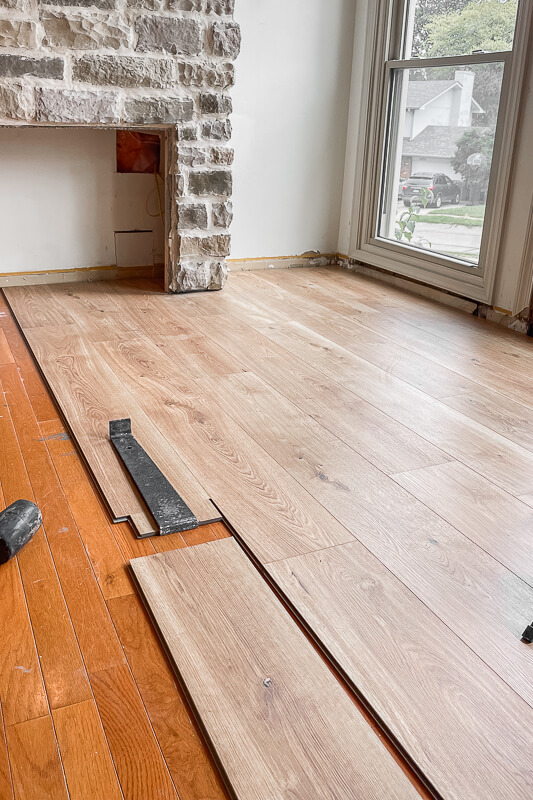
Paid partnership with LL Flooring
Hello again! It’s been quite a busy year for our little family, and I’ve been having a lot of fun fixing up our house in Nebraska.
LL Flooring launched their new Duravana plank flooring line, and it’s awesome. It’s the latest and greatest in flooring technology. They combined all the best features of vinyl, laminate, and wood, to create an ultra-hybrid plank flooring that’s superior to anything on the market. I love that it’s family-friendly, eco-friendly, waterproof, and dent/scratch-resistant.
Duravana plank flooring is also easy to cut, and with a simple snap and tap, there are minimum tools needed for installation. You could easily finish an install in one afternoon for a moderate sized room. Duravana is seriously the future of hard surface flooring.
This post includes affiliate links. If you purchase from these links, I may get a small commission from the seller. But the great thing is, this doesn’t cost you any extra money!
MATERIALS NEEDED
Duravana Hybrid Resilient Flooring– the style I chose is Bay Bridge Oak
Carpenter’s Square
Floor Installation Kit
Quikrete Setting Cement
Putty Knife
Tape Measure
Table Saw
Knee Pads
Miter Saw
Flooring Mallet
Long Pro Pull Bar
Vapor Barrier
3/4 inch Particle Board
Drill
Screws
Getting Subfloor Ready for Duravana Plank Flooring
Within 24 hours of signing the papers for our house, we started to tear down walls in some areas and build them back up in others. The flooring on the main level included tile, which we removed using a jackhammer with a floor scraper bit. It made a HUGE mess.
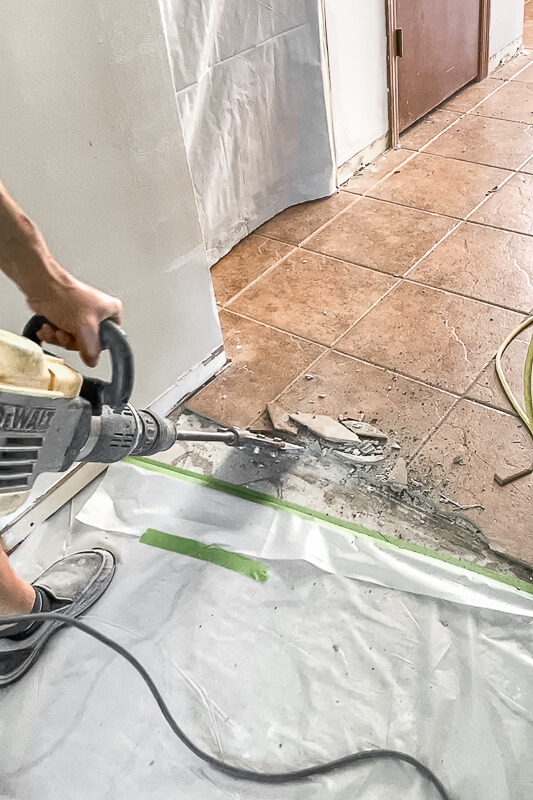
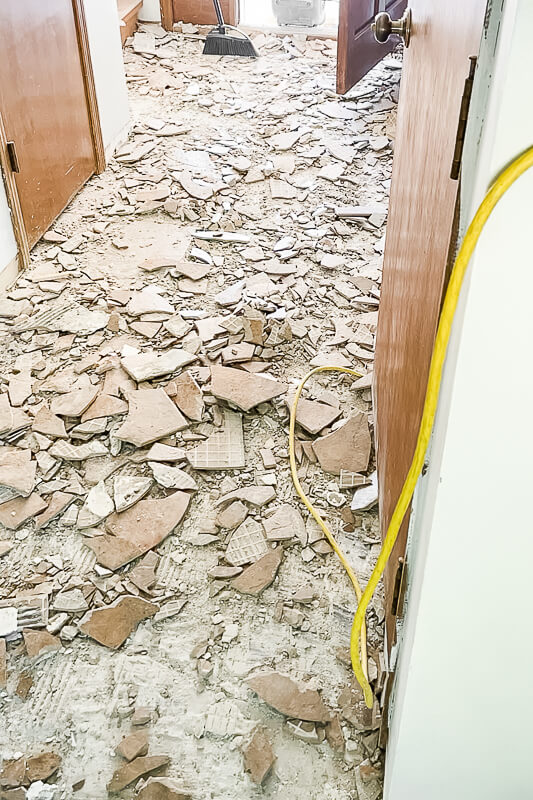
The floor needs to be pretty level, and there was an area near our front door that was several inches taller than the rest of the concrete. We filled the area with quick-setting cement and feathered it out so the grade was subtle. We also filled any large cracks or depressions in the concrete with cement.
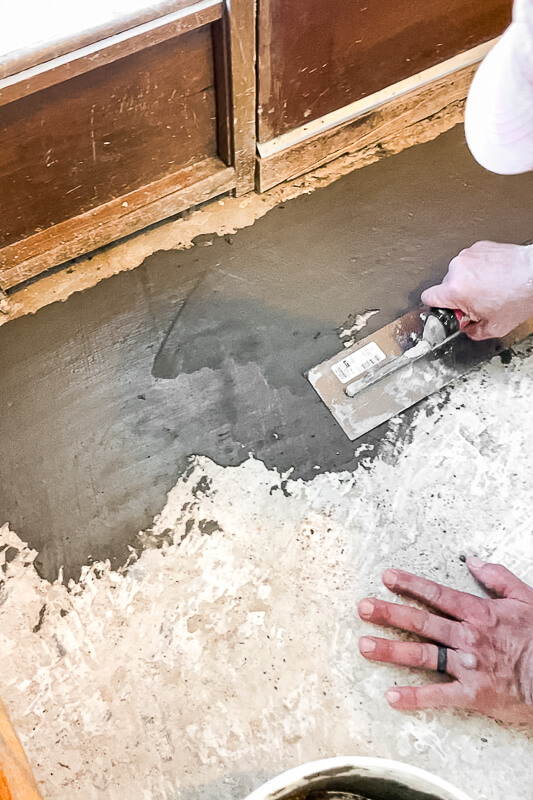
One of the Duravana features I love most is the pre-attached pad on each plank, which is one less step to worry about. The only underlayment we did was a plastic sheet to act as a vapor barrier over the exposed concrete.
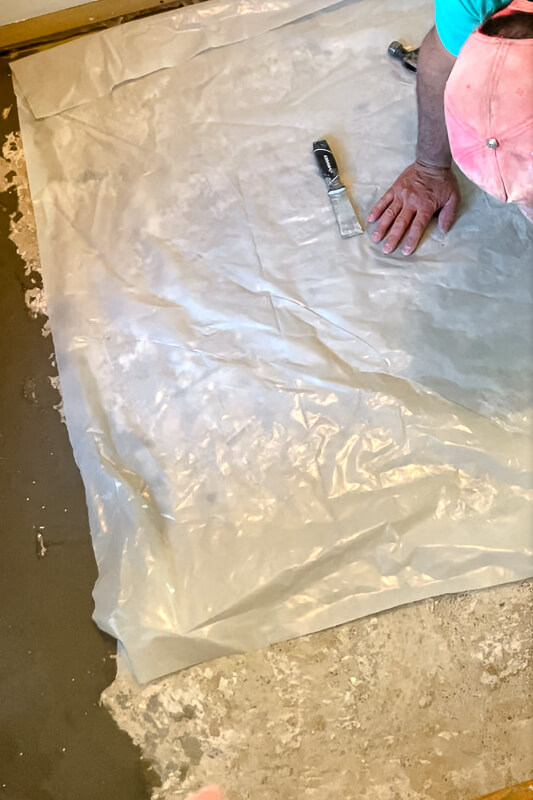
Another area we had to prep was next to our kitchen. During our initial demo, the flooring in the former kitchen area was different from the hardwood flooring throughout the rest of the floor. So, in that space, we ripped out the laminate flooring and cut 3/4 inch particle board which was as thick as our existing hardwood flooring, and screwed the pieces into the subfloor with 2-inch screws. This created a level plane across the whole space.
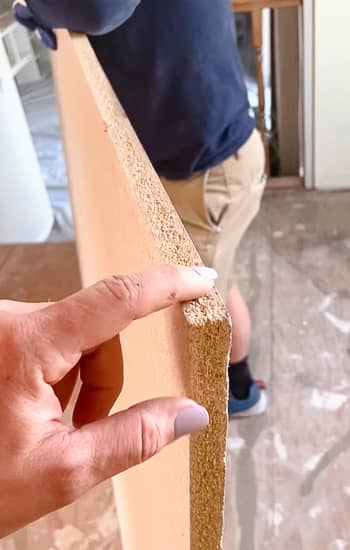
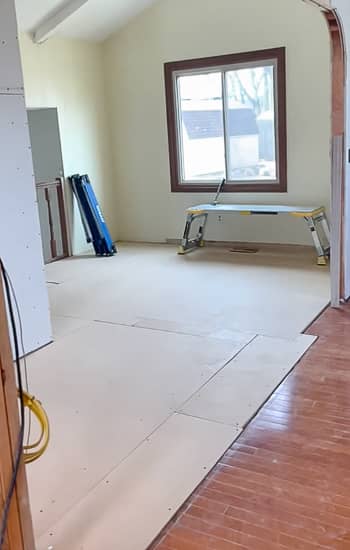
The remainder of our flooring was hardwood, which made it easy since we could just lay the new plank flooring on top, creating a floating floor. We removed all the baseboards because we wanted new baseboards anyway, but also because you typically want to add baseboards after your flooring to cover any gaps between the flooring and the wall. If you’re strongly opposed to removing your baseboards, consider ½ inch quarter-round molding along the bottom of your baseboard.
How To Lay Your Duravana Plank Flooring Straight
Our existing hardwood flooring and walls are super crooked, which makes it difficult to lay flooring straight. We wanted easy and quick installation, and having to check and recheck our work with levels is time-consuming. The solution was to create a fixed, straight point for the first several rows to butt up against.
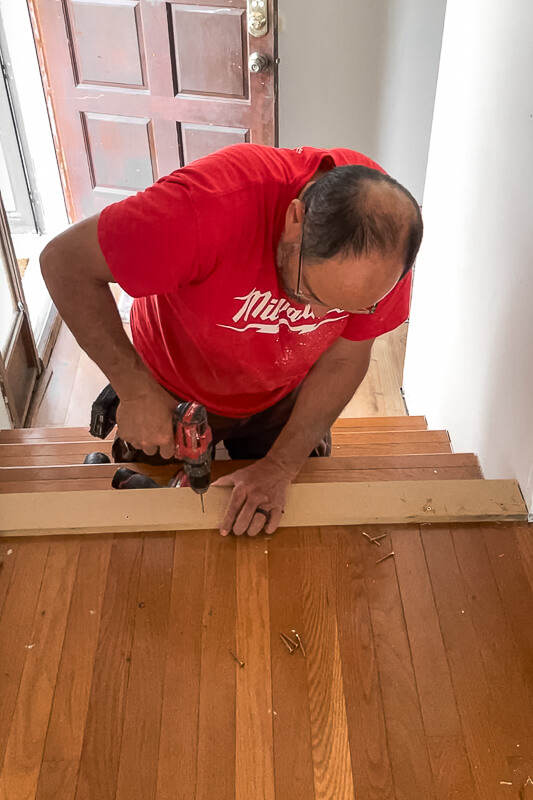
In the future, we plan to install bullnose stair treads (which are also available from LL Flooring in their Duravana line). Bullnose treads need to be glued down, and since we weren’t ready to tackle that yet, Grandpa (my husband’s dad whom everyone calls Grandpa because we’ve all forgotten his name) screwed a perfectly straight, temporary piece of wood to act as our “floor straightener”. He started by laying one long row of wood Duravana plank flooring to do a test fit.

From there, he laid several more rows, always making sure the first board he laid was butted against the temporary wood.
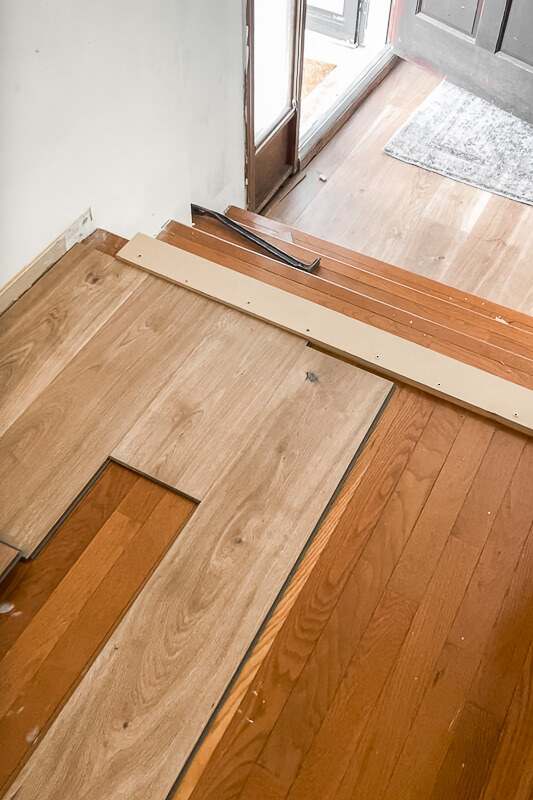
Which Direction To Lay Wood Flooring
We put a lot of thought into this, and in the end, we just flipped a coin. Honestly, it didn’t really matter since no matter what, our new floors would end up butting against the same flooring going in an opposite direction due to the layout of our home. That’s what happens when you have several sets of stairs that run in different directions. Our house is pretty much a big square, so we felt like it was a win-win decision.
How To Stagger the Seams in Wood Flooring
Our Duravana plank flooring would look weird if the seams touch each other and run straight across the length of the room. To prevent this, we staggered our pieces by dividing them into thirds. The first plank in the first row was full length, the first plank in the second row was 2/3 the length, and the 1st plank in the 3rd row was 1/3 the length. Rule of thumb is that the end seams be offset by six inches, at least.

When we’d get to the end of the row, we’d cut off the excess and save it for when we needed one that size.
How To Install Duravana Hybrid Resilient Plank Flooring
This felt like the easy part, and the instructions were simple.
When attaching one plank to another, hold the plank at an angle and insert it into the plank lying on the floor. Then, press it down until it lies flat. I hit the top a few times with a rubber mallet to make sure it was completely locked into place.
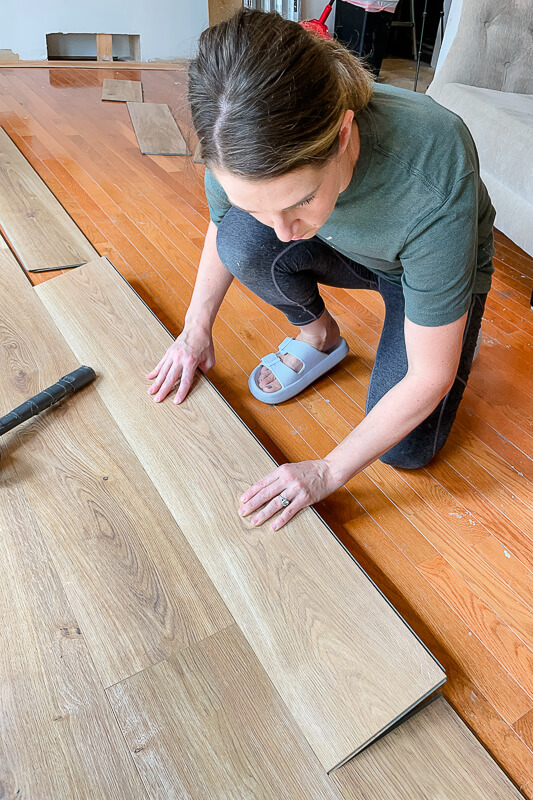
The long side is now locked into place, and the shorter side needs to be as well. I used a floor puller, a mallet, and a tapping block to lock the sides together. The tapping block was just a small piece of leftover plank that fit perfectly into the groove of the flooring. It helps prevent damage caused by the floor puller coming into contact with your new plank. I placed the tapping block next to the plank, hooked it on the end of my floor puller, and then tapped my mallet against the opposite side. This shoved it into the neighboring plank to eliminate any gaps in the Duravana plank flooring.
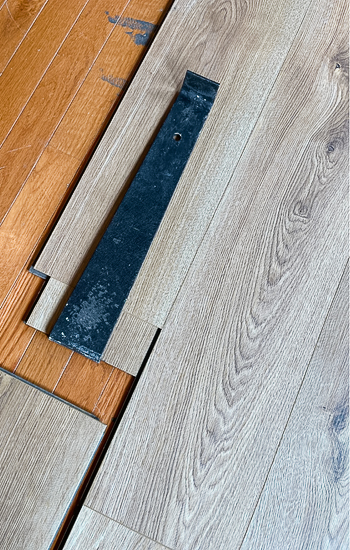
You’ll know if you did a good enough job locking the plank flooring into place by checking your seams. Here is Grandpa’s seam before and after. He’s pretty good at this.


How To Cut Wood Flooring Planks
Nothing fancy here. Just the basic carpenter square and your choice of cutting tool. I used my miter saw, but you can use a circular saw, or LL Flooring sells an inexpensive floor cutter.
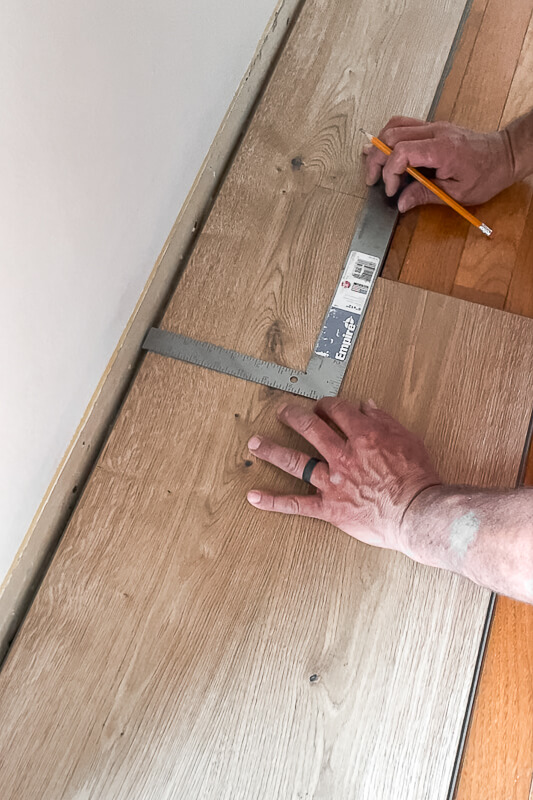
When it comes time to cut the end piece of a row, there’s no need to worry about an expansion gap because this Duravana plank flooring won’t swell. It also won’t contract. That’s the benefit of Duravana’s waterproof technology. Isn’t that awesome?! When we measured to cut the final piece in a row, we set our tapping block up against the wall. This was helpful for when we installed that piece since now there would be enough room to hook the floor puller underneath so we could tap that last little bit into place.
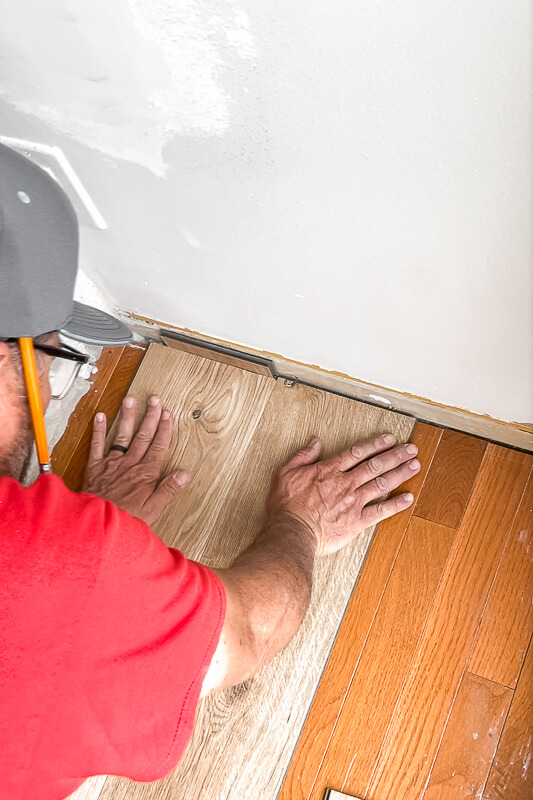
There were some areas, like the last row against a wall, that required me to trim down the length of the board. My table saw came in handy for this. I also used my jig saw to cut a hole above a floor vent, and then inserted a matching vent cover I also got from LL Flooring in the same color as my flooring (Bay Bridge Oak). Eventually, I’ll seal the crack with some silicone caulk.
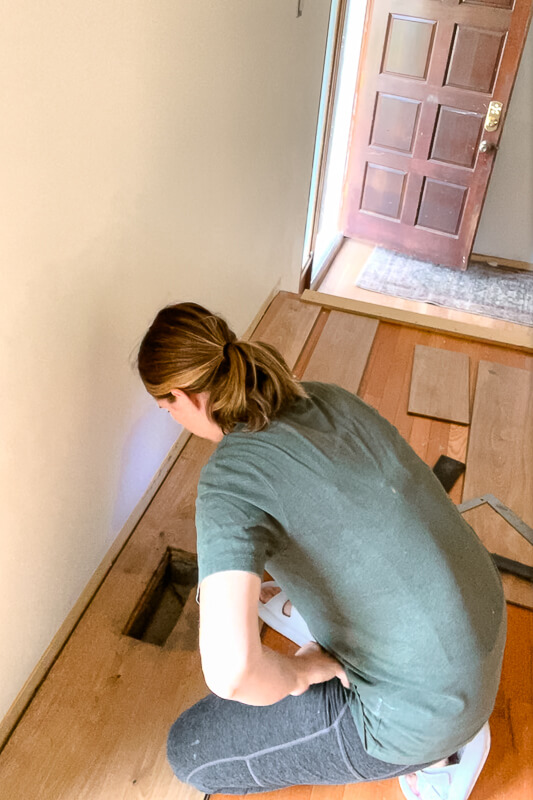
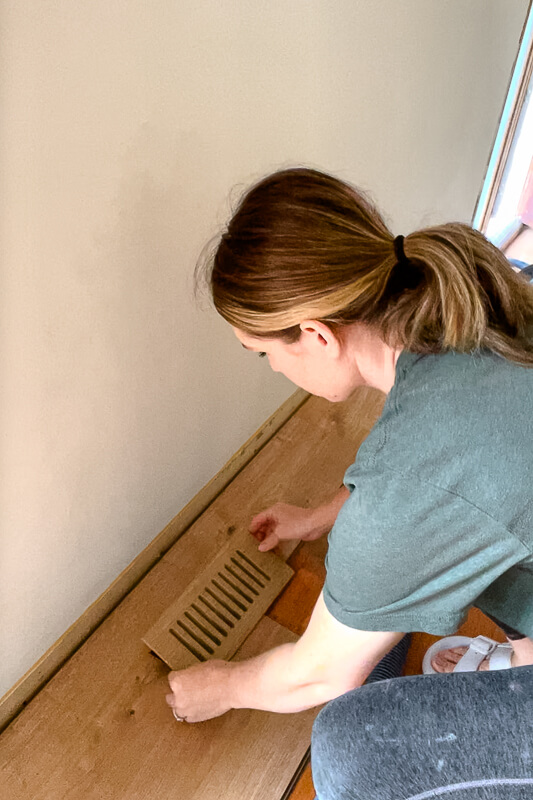
And That’s How To Install Wood Flooring!
All that’s left is to install new baseboards. Our old baseboards were in bad shape, so we’re planning on installing new ones. When the boards butt up with kitchen cabinets, usually a toe kick is needed. It’s trimmable and conceals all the viewable ends. But, even without our baseboards or toe kicks, look at how beautiful our new floors look!
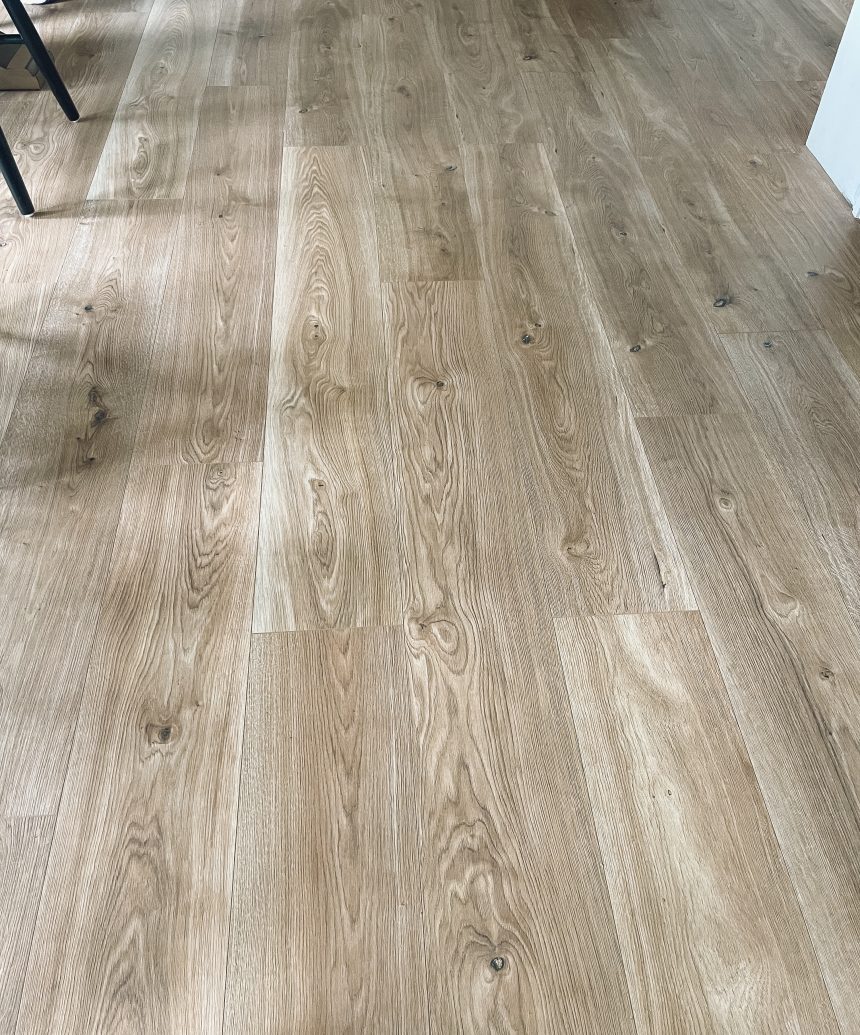
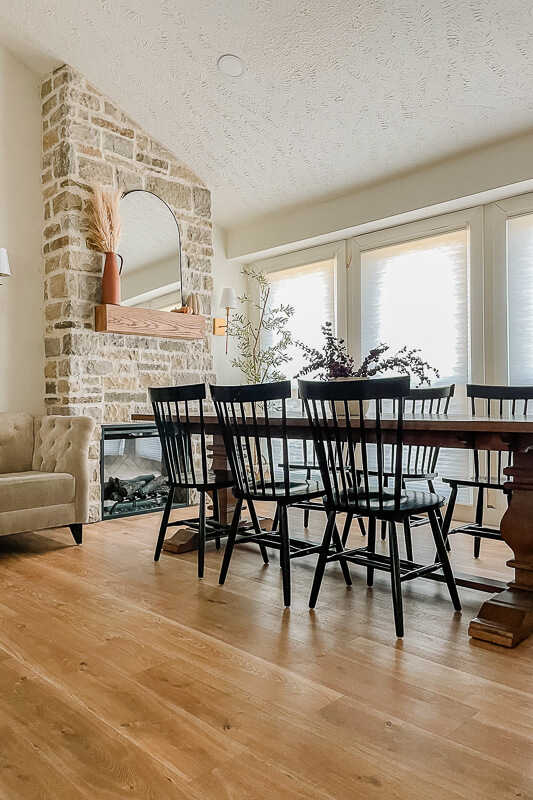
New kitchens and flooring are the two projects that make the biggest impact in a house. I had no idea how dark my previous flooring was because the new Duravana plank flooring instantly brightened my house. Another awesome bonus is the color and pattern hide dirt so well. Well, I guess that could be considered not awesome, but for me, it’s awesome.
Because of how wide the planks are, my living area feels more modern, which is a hard thing to do in my old-style house. My floor looks like real, textured wood, and it will take me years to notice a matching pattern. Thank you, LL Flooring, for spending the time researching and developing these new types of Duravana plank flooring!

If you have plans to do an affordable kitchen remodel, click here to read how I installed shaker doors and painted my kitchen cabinets.
Leave a comment if you have any questions or reviews about the Duravana plank flooring. I’m here to help!
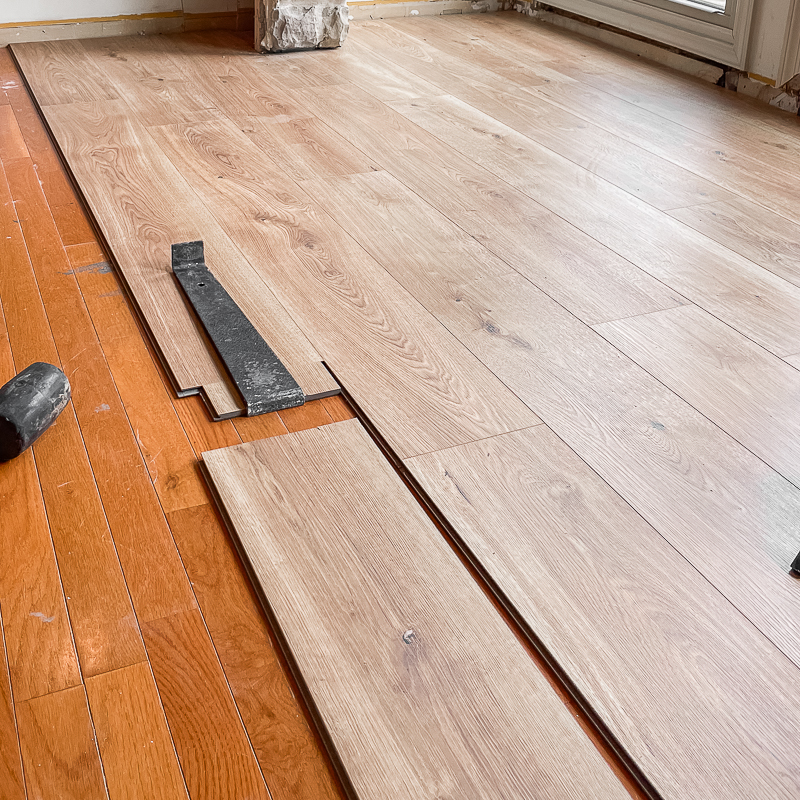

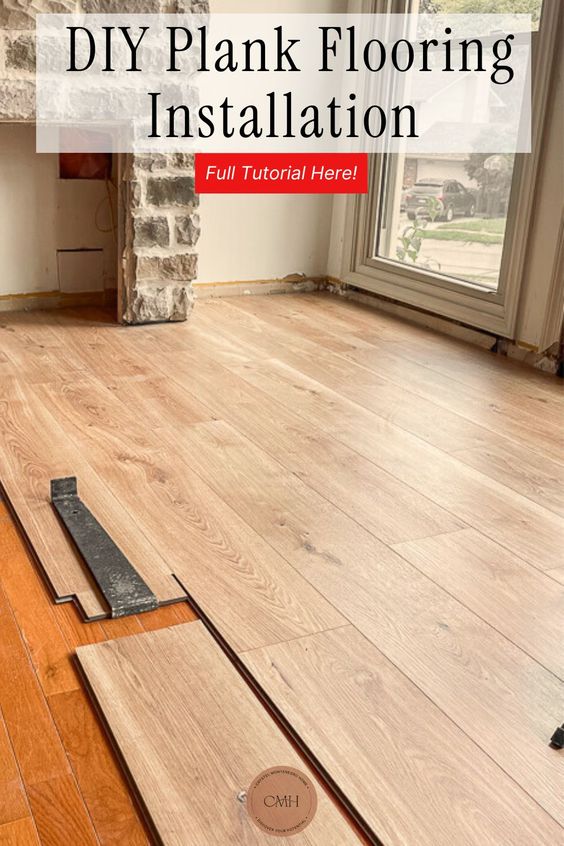
Loved the step-by-step guide! It was so helpful to have the measurements and diagrams included. I was able to install my Duravana plank flooring with minimal assistance. The planks look amazing and it was a huge cost savings compared to hiring a professional.
Just finished installing my Duravana plank flooring using your instructions and it looks amazing! The details about the underlayment and subfloor prep really made a big difference. Thanks for sharing your experience and expertise
That is awesome! Thank you for letting me know! I LOVE their flooring
What is the longest run without a transition bar with this type of flooring do you have in your home? I’m wanting to try and run my entire living area( roughly 1000 Sq ft or so) with no transition pieces
Hi – You can install 1000 sqft without a transition piece, so I’m not quite sure what you’re asking. Could you clarify?
Curious if you’ve had to repair or replace any boards I just installed and received over 1/3 of the flooring damaged in the boxes and just received a call back due to the edges chipping off.
None of my boards were damaged when I received them. LL Flooring is a great company so I’m sure they’ll help get them replaced.
I’m thinking about putting these exact floors in my house. How are they holding up? Any tips looking back now?
They are holding up so well! It’s amazing how durable they are. Totally recommend them.